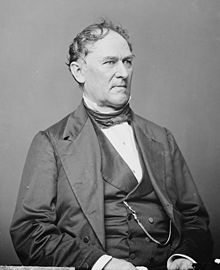Orville Hickman Browning
| Orville Hickman Browning | |
|---|---|
 |
|
| 9th United States Secretary of the Interior | |
|
In office September 1, 1866 – March 4, 1869 |
|
| President | Andrew Johnson |
| Preceded by | James Harlan |
| Succeeded by | Jacob Dolson Cox |
|
United States Senator from Illinois |
|
|
In office June 26, 1861 – January 12, 1863 |
|
| Preceded by | Stephen A. Douglas |
| Succeeded by | William A. Richardson |
| Personal details | |
| Born |
February 10, 1806 Cynthiana, Kentucky, U.S. |
| Died | August 10, 1881 (aged 75) Quincy, Illinois, U.S. |
| Political party | Whig, Republican |
| Spouse(s) | Eliza Caldwell Browning |
| Alma mater | Augusta College |
| Profession | Politician, Lawyer |
| Military service | |
| Service/branch | Illinois Volunteers |
| Battles/wars | Black Hawk War |
Orville Hickman Browning (February 10, 1806 – August 10, 1881) was a Republican Senator from Illinois.
Browning was born February 10, 1806 in Cynthiana, Kentucky. He was a veteran of the Black Hawk War. Browning was a Whig delegate to the anti-Nebraska convention held at Bloomington, Illinois, in May 1856. This convention laid the foundations of the Republican Party.
Browning was appointed to fill the U.S. Senate seat of Stephen A. Douglas after Douglas' untimely death. Browning's bid for re-election as Senator from Illinois failed in 1862, leaving Abraham Lincoln with no personal friends in Congress. It was rumored that Lincoln was considering appointing Browning Secretary of the Interior to replace Caleb Blood Smith, but he did not become Secretary of the Interior until the Johnson administration.
President Andrew Johnson appointed him Secretary of the Interior serving from 1866 to 1869. Browning entered into a private law and lobbying practice in Washington, D.C., after the war, partnering with Thomas Ewing Sr. and his son, Thomas Ewing Jr.. Browning died August 10, 1881 and is buried in Woodland Cemetery, Quincy, Illinois.
In 1844, Browning successfully defended five men who had been accused of the murder of Joseph Smith, founder of the Latter Day Saint movement.
...
Wikipedia
